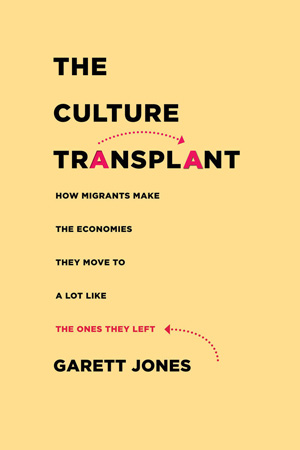
The Culture Transplant is about the fact that on average, immigrants never fully assimilate. Europeans who violently migrated to North America usually didn’t assimilate to Native American culture and levels of technology. Chinese migrants who migrated peacefully across Southeast Asia didn’t fully assimilate; instead, on average, they became “market dominant minorities.” Recent statistical work by my fellow macroeconomists shows that these aren’t outliers or exceptions. Instead, they illustrate a general rule: cultural and economic behaviors migrate and persist across the generations.
That’s looking across centuries after 1500 when humans ran a series of massive and often evil migration experiments, and economists have learned from those experiments. I should emphasize that isn’t a story about the benefits of geography: the richest parts of the Americas used to be closer to the equator (especially the Inca, but also the Aztec and Maya), but now they’re far from the equator. That’s true both to the North (US, Canada) and the South (Argentina, Chile, Uruguay). Prosperity, by and large, went where the Europeans went in the Americas, and it lasted for centuries.
And it’s not like being close to the equator is an economic curse today: the richest country in Southeast Asia is almost on the equator itself: Singapore, with a majority population that’s of Chinese descent. So geography-based stories of prosperity are missing a lot, and they keep us from seeing the transformative power of migration to change the wealth of nations.
If you want to know how rich a nation is today, you’ll do a lot better job if you know the history of where a nation’s ancestors came from, rather than knowing the history of the land itself. Prosperity has deep roots, and those deep roots get transplanted when people migrate.
The Culture Transplant debunks the view that immigrants fully assimilate in a generation or two. This is something my fellow economists know—we have vast empirical literatures showing that, for instance, you can partly predict people’s savings behavior just by knowing which country their parents or grandparents came from. But even though it’s in the journals, and it’s well-replicated, my fellow economists have been squeamish about telling the public about this body of research. As with enriched uranium, they’re probably afraid it could fall into the wrong hands.
The book also critiques the Open Borders worldview, the view that unlimited migration to the rich countries would be an obvious global good. I show that most scientific innovation worldwide happens in just seven countries—what I call the I-7. I also show that a nation’s rate of innovation is extremely sensitive to the quality and competence of a nation’s government. Since innovation spreads worldwide—as with the Covid vaccines—that means that poorly-chosen immigration policies in the I-7 could hurt not just those seven nations, but the entire planet.
People everywhere on earth have a strong interest in making sure that nothing weakens the power of France, Germany, Japan, South Korea, China, the UK, and the US to keep on innovating. Imprudent immigration policies that ignore cultural transplant theory place that innovation at risk.
Ultimately, I wrote this book because nobody else had. For the last twenty years I’ve been asking the Adam Smith question: Why are some nations so much more productive than others? I’d found some new answers in my own research, summed up in my earlier book Hive Mind. But at the same time, I kept reading findings by a separate group of researchers, especially three excellent professors at Brown University: David Weil, Louis Putterman, and Oded Galor. Their work on the “Deep Roots” of economic prosperity suggested that many of the important economic differences across countries began centuries, even millennia ago. Their work needed a plain-English explanation, so that got me working on The Culture Transplant.
I should note that while I was working on my book, it turned out Galor was writing one as well, which I’m glad to say has now become the global bestseller The Journey of Humanity.
The preface, for sure, is what I want readers to encounter first. I ask, “What’s the best practical immigration policy for the average middle-income country?” My answer: “Let in just about anyone from China.” I mean, just look around: across Southeast Asia, a good predictor of how rich and market-friendly a country is turns out to be “Percent of Chinese Ancestry.” More poor countries should be more welcoming of large, culturally and economically transformative Chinese immigrant communities. Based on the experience of Southeast Asia, it’s a pretty reliable path to widespread prosperity in the long run.
And the preface offers a great illustration of a key message of cultural transplant theory: that well-chosen migration policies can improve a nation’s long-run economic destiny.
I’ve written a trilogy now, my Singapore Trilogy. Readers are often persuaded by what I say in all three books—Hive Mind, 10% Less Democracy, and now The Culture Transplant—but they can’t quite bring themselves to say so publicly. I get DMs, or emails, or hear comments at conferences that let me know that readers are persuaded by what I have to say, but they just can’t talk about it in public, can’t teach it in the classroom.
I know I won’t win over a lot of public voices—people are understandably risk-averse about speaking up on controversial social science topics—but I do know that I’m routinely winning over people’s private minds. And for me, winning over their private minds is a massive achievement.
I hope that The Culture Transplant wins over many more private minds.


Garett Jones is a macroeconomist at George Mason University renowned for his work on the interplay between IQ and national economic outcomes. He is the author of Hive Mind: How Your Nation’s IQ Matters So Much More Than Your Own (Stanford University Press), a book that explores the collective intelligence of societies. Jones combines elements of neoclassical macroeconomics and Chicago-school microeconomics to approach complex economic issues. Known for his interdisciplinary scholarship, he delves into the social sciences and philosophy, challenging conventional wisdom in empirical research.